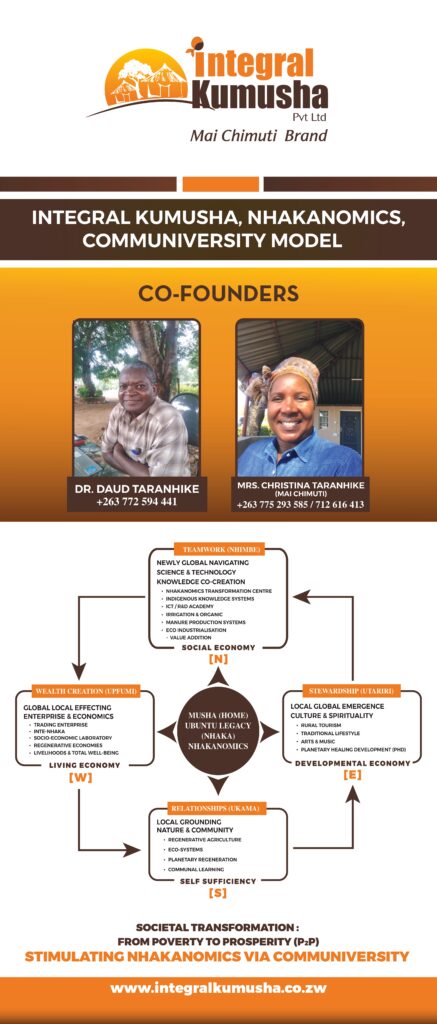Overview
Nhakanomics evolved from Dr Daud Taranhike’s PhD research innovation which aims to eradicate poverty among the majority of people and economic turmoil within Zimbabwe and many African nations after attaining political independence. As such Nhakanomics is an economic approach which is anchored upon the African indigenous ways of wealth creation and heritage based systems of creating an inheritance or legacy (nhaka) for future generations. Zimbabwe and indeed most African nations need an economic system which resonates with the majority of the people and which is integral and holistic. In other words, Nhakanomics is an integral economic system that is that incorporates the African principles of creating legacy (nhaka), hence the coined word Nhakanomics which is a combination of two words legacy or inheritage (nhaka) and economics.
Nhakanomics draws from the spirit of Ubuntu (Unhu in Shona language) which emphasises oneness and love with a strong focus on ensuring sustainability and a better future for the next generations. While Nhakanomics is based on African principles, it also draws and blends with some relevant exogenous practices. This approach recognises the importance of stewarding our heritage and all available resources to avoid deletion and exploring ways of taping on existing opportunities, gifts and talents. The important issue is to have an economic approach that is not alien to the majority of the people hence nhakanomics becomes an alternative of capitalism which is individualistic and narrow in scope. The development of nhakanomics destroys the notion that capitalism is universal and one size fits all. Instead, this a recognition that each society can and should nurture and develop its own economic system that helps each society to realise its economic genius which gives it rightful place on the global economic space.
The Nhakanomics model is shown in a diagram below and it emphasises the indigenous Shona way of creating inheritance and how that is blend with the Integral Economics approach as espoused by Lessem and Schieffer (2016). Although this model is in its infancy, it has attracted great attention from academics, researchers and practitioners on the important need to establish an economic system that resonates with our African cultural and traditional practices instead of assuming capitalism as universal and one size suits all economic system. Our strong belief is that each society should have its own economic system that resonates with its people rather than adopting alien models which have failed to provide real economic freedom to most African countries and the Global South.
NHAKANOMICS MODEL
The Nhakanomics concept and model has four key pillars which are aligned to the creation and development of an integral economic system and the creation on legacy.
CENTRE (Oneness and Legacy)
The Ubuntu Spirit of oneness and love is at the centre of this economic model. Its aim is for every member of the society to prosper not just the elite or small number of people who control the economic levers. In this regard, success is measured by the positive development of society now and in the future. The emphasis is more on collaboration and cooperation rather than competition and individuality. The system has a futuristic perspective that strives that future generations must be better than current generation.
SOUTH – Relationships (Ukama)
Relationships that transcend communities, nature and generations. This perspective recognises the importance of all creation and the need to live in harmony with entire ecosystem without causing or creating an ecological crisis. Man has a responsibility to nurture this relationship and maintain the ecological balance to ensure sustainability, hence developing a self-sufficiency economy.
EAST – Stewardship (Utariri)
Stewardship brings with its accountability and progress. Lives and livelihoods have be improved and developed by shifting perspectives towards renewal and transformation. Faithful stewards improve what has been entrusted and bestowed upon them for the benefit of the entire society. This calls for the recreation of the garden of Eden so to speak leading to a developmental economy.
NORTH – Teamwork and Collaboration (Nhimbe)
Strong societies evolve through strong collaboration of their members. As members work closely together and share ideas, they co-create new knowledge on how to become innovative, and enhance productivity. This is so fundamental because through teamwork and close cooperation, members appreciate the different talents and creativity. This social cohesion generates remarkable energy and knowledge that is necessary in developing a strong social economy.
WEST – Wealth Creation (Upfumi)
Individual and collective wealth creation results from collaboration and sharing of ideas (knowledge) and reshaping the economic landscape of the society and its people. economic performance and measures are derived from entire cycle. Focus is no longer on making maximum profit but on how best to profit the community, society and future generations. Hence the general standard of living is improved for everyone leading to an effective living economy.
Therefore, Nhakanomics is a unique African way of living guided by the spirit of Ubuntu which ensures active participation of all members in socio-economic development and growth. This is an alternative to the neo liberal economic system with particular focus on creating a great legacy for future generations. The world is desperate for a new economic order that is humane and does not have a few extremely rich controlling the marginal and the poor.
THE NHAKANOMICS TRANSFORMATION AND RESEARCH ACADEMY
The establishment of the Nhakanomics Transformation and Research Academy focuses on how to transform livelihoods and wellbeing of people at different levels
- Personal transformation and change
Renewing the inner being towards self-appreciation, refocusing and reshaping the inner being and renewing the mind towards generational thinking and community participation.
- Household or Homestead transformation and change
- Community Development and change
Creating prosperous communities
- Societal transformation
- Earth Regeneration and renewal
KNOWLEDGE CO-CREATION
- Research and Development
- Conferencing
- Special Programmes


